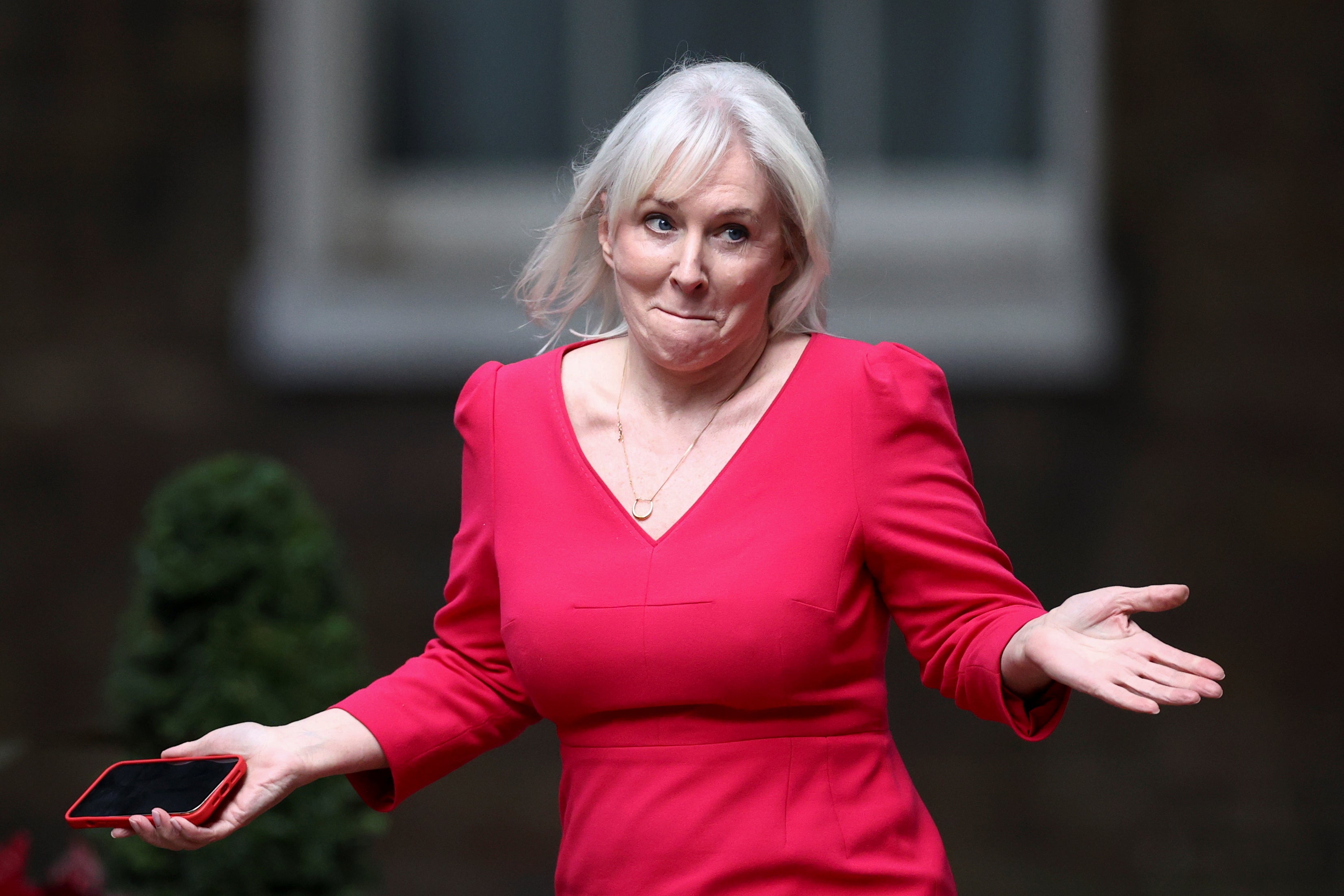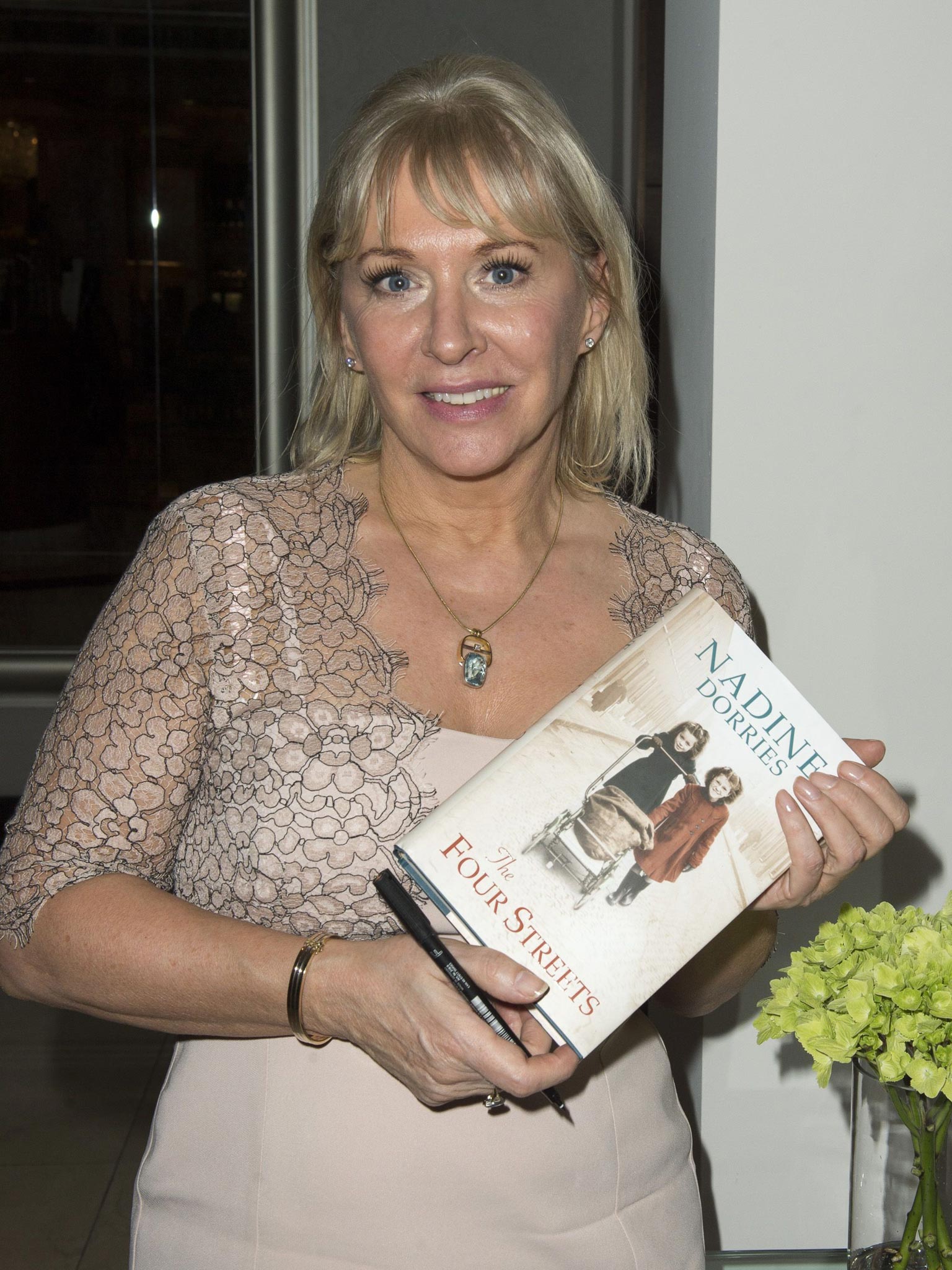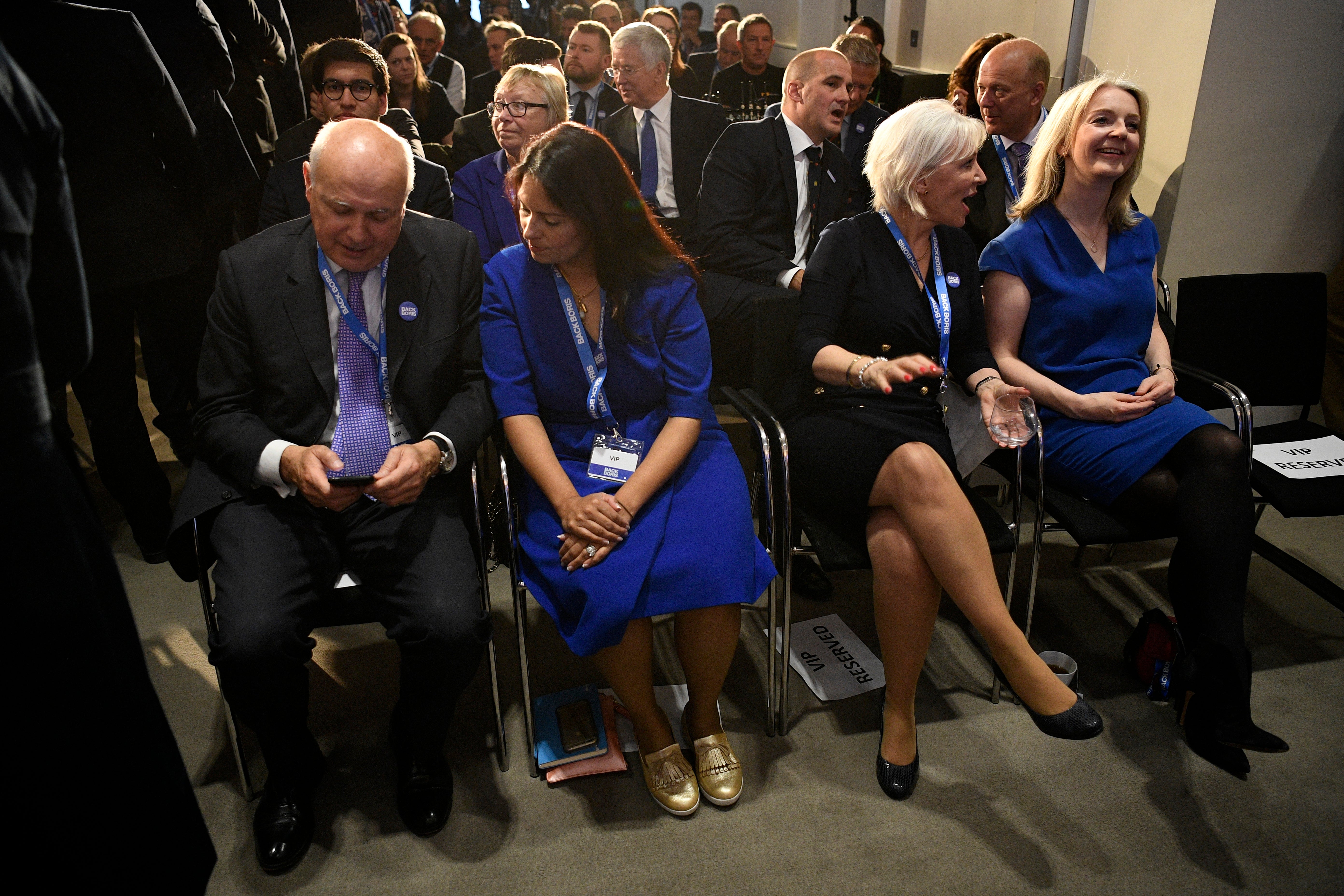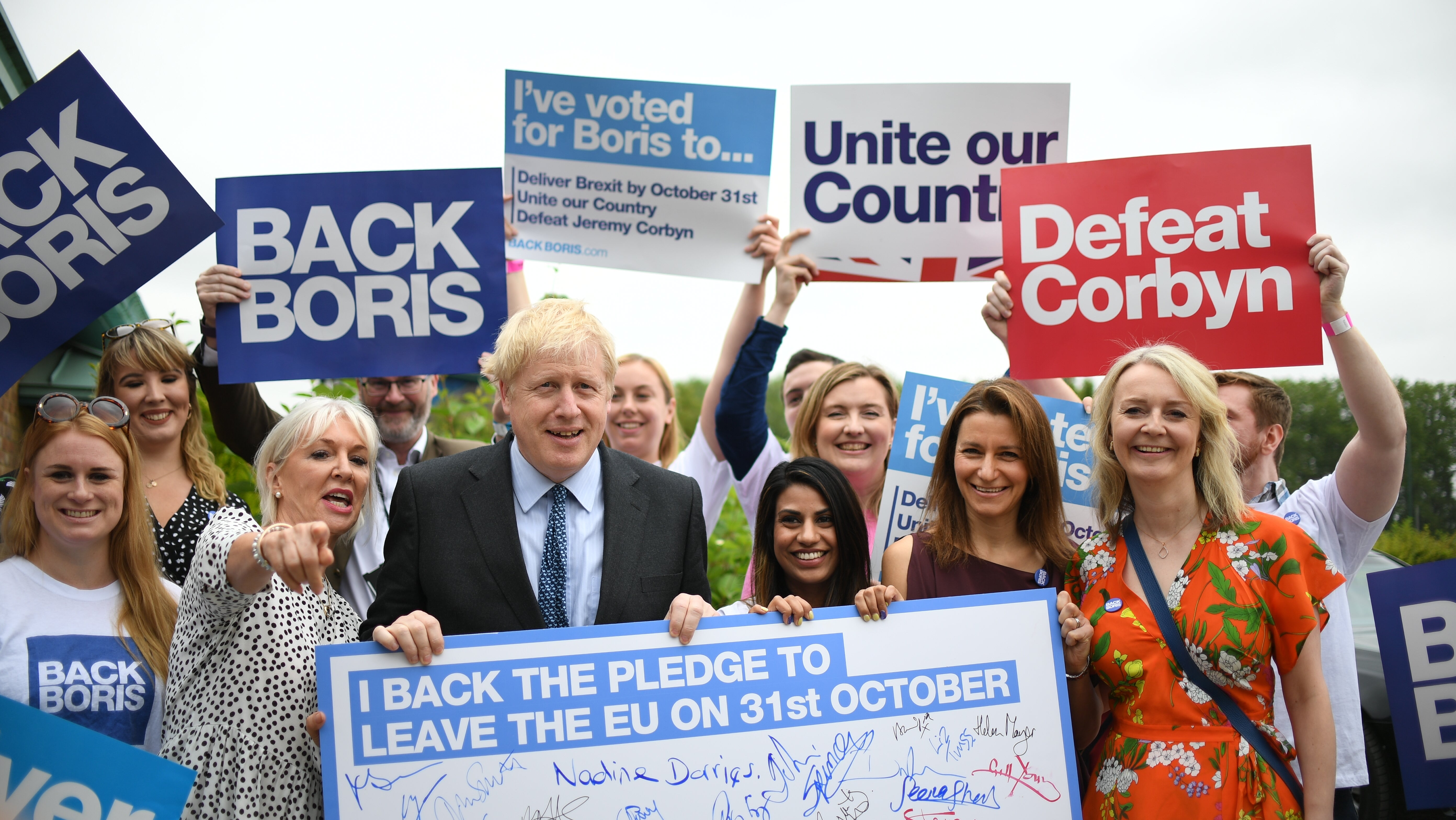Nadine Dorries: The best-selling reality star with the BBC in her sights
Britain’s new culture secretary – a published author, I’m a Celeb star, and a former nurse – has certainly taken an unorthodox path to cabinet. Sean O’Grady takes a look at the unlikely rise of Nadine Dorries, the latest culture wars warrior who’s no stranger to controversy


What does a minister of culture look like in a populist government? Why, the right honourable Nadine Vanessa Dorries MP, of course. What she might call the “metropolitan elite” decry her for her prolific output of middle-brow historical novels (such as The Children of Lovely Lane) and her appearance on ITV’s I’m A Celebrity…Get Me Out Of Here!, an unusual career move for an apprentice statesperson.
It’s been pointed out in these same snooty circles that her counterpart in Germany is a trained art historian, and that the French culture minister has written a book about Verdi, but no matter. Her very lack of high-brow tastes is the reason why Dorries has been given her promotion from middle-ranking minister at the department of health to the cabinet. She is the living embodiment of popular tastes and culture, and she’s proud of it. Her supposed unsuitability for the role makes her the best person for the job. Grasp that and you grasp all.
That said, it was also probably a move that appealed to Boris Johnson’s sense of mischief and talent for political distraction. The shock of the arts and media cliques at her arrival no doubt caused him some amusement and served a wider purpose. She is, in effect, the new head of the armed forces in Britain’s ceaseless culture wars, and the rebarbative Scouser is very much for the fight.
She’s referred to the BBC licence fee as a “Soviet” form of imposition and could wage unending campaigns against it. She will also, no doubt, try to use her role to get Paul Dacre, former editor of the Daily Mail, installed as head of Ofcom, which appears to be what No 10 wishes. She’ll push to privatise Channel 4 despite what Jon Snow or the public consultation says. And she’ll steadily colonise the arts and media establishment with Johnson sympathisers. The arts won’t be getting any new money and will have to drop any “wokery”. She makes Oliver Dowden and John Whittingdale, the outgoing culture team, look like luvvies.
Nuance and detail won’t be central themes in Dorries’s new department. A few years ago she stated: “Left-wing snowflakes are killing comedy, tearing down historic statues, removing books from universities, dumbing down panto, removing Christ from Christmas and suppressing free speech. Sadly, it must be true, history does repeat itself. It will be music next.”

Of course, we’ve had culture secretaries before who knew nothing about opera or foreign film. Stephen Dorrell, for example, privately despaired that he was ill-equipped for the role handed to him in John Major’s cabinet – a view confirmed when he travelled to the Cannes Film Festival and referred to legendary actor Jeanne Moreau as a “distinguished Frenchman”.
But the difference between Dorrell and Dorries is that while Dorrell was mortified at his mistake, Dorries would claim it as an emblem of her working-class authenticity, which is partly right. She grew up on a council estate. When David Cameron and George Osborne were running the Tory party they sneered at “Mad Nad” and her provincial ideas about abortion, grammar schools and Europe. Cameron put her down at PMQs by suggesting the troublesome honourable lady was “frustrated”. Osborne, a smirk permanently scampering around his lips, suggested that she didn’t agree with a single Tory government policy. She, in return, cuttingly referred to them as “two arrogant posh boys” who didn’t know the price of milk.
It has to be added that none of that prevented her from being unnaturally devoted to Boris Johnson, an Old Etonian not short of self-confidence and whose last trip to Asda, or even Waitrose, must have been while he was at Oxford. At any rate, her promotion is one obvious symbol of the change in the character and ethos of the Conservative Party. There were always working-class Tories (much to Labour’s irritation and dismay), but never before have the Tories relied on the working classes for their fortunes.
The daughter of a bus driver from County Mayo and her mother an English Protestant, she grew up in Liverpool at a time when sectarianism was as rife as it still is in Glasgow and Northern Ireland. But in her own words: “Being part of a mixed-religion family meant I went to both churches with my respective parents. The community I grew up in was warm and close-knit. Everyone in my street was an aunt or an uncle, so it was a bit of a shock when I actually discovered they weren’t when I was 16. We were very poor when I was young. I remember being hungry because we simply had no food to eat.”
She went on to say: “We used to hide from the rent man, as we couldn’t pay him. Some days there would be no food. I remember vividly the sound of my tummy and my dog’s stomach rumbling with hunger pangs.”
She is in fact more Johnson than Johnson himself in many ways, such as her quite genuine hatred for the “metropolitan elite”
Nowadays, though, Dorries’s royalties from her books and ministerial salary more than cover the cost of running a Grade 1 listed country home in the Cotswolds, as well as a base in London. After some time as a nurse, Dorries set up her own childcare business, and sold it on to Bupa in 1998, presumably for a pretty penny. She got £100,000 as an advance for her first three novels, which drew heavily on her childhood experiences and work as a nurse. Her ex-husband, a mining engineer, was well-off in his own right, involved in various financial schemes that received some negative attention in the press. They’ve been divorced for more than a decade.
Dorries is rightfully protective of her family and private life, though this hasn’t always proved sufficient defence against malicious gossip. Some spin doctors hovering around Gordon Brown’s government once concocted a story that she’d had a one-night stand with another MP, for which Brown had to send her a formal note of apology (actually a more of a non-apology, but it was good as it was going to get). And hardly a private activity, though she treated it as one, she fell seriously out of favour with her parliamentary colleagues, party leadership and local Mid Bedfordshire constituency party for her famous appearance on I’m A Celebrity in 2012, described by one columnist as “an insult to everyone in Britain”. With the sense of bawdy humour the series is renowned for, the producers ensured that the honourable lady was forced to eat not only kangaroo anus (mercifully not in situ) but camel toe. Naturally, she also had to spend some time locked in a cabinet surrounded by vermin, excellent training for her as we see now.

As punishment for her antics in the jungle, she had the whip removed for failing to inform anyone that she was off on the jaunt, and nor did she declare her earnings from the show (about £20,000) according to the rules. In due course, she apologised to the Commons for her failings, but she also wrote about her feelings in a characteristically defiant column for The Spectator, grabbing the opportunity to compare herself to Margaret Thatcher: “After my eviction, I sank into a much-needed bath, then checked my neglected inbox. A senior figure at Google emailed me to say that he had become an avid watcher of the show and that I had had twice as many Google searches as David Cameron.
The searches came from Newcastle, Manchester and Liverpool – places that are seldom concerned about Tories. It was not always thus. When I was growing up in inner-city Liverpool, the council was in Conservative control and the city had eight Conservative MPs. A grocer’s daughter – considered vulgar by the old guard of her own party – connected with the strivers and blue-collar workers and had a true Scouse following. Today, interest in a Tory MP from Liverpool makes a Google exec take notice.”
The future culture secretary added: “Part of the reason for eating the camel toe is that, when I came back, I might win a hearing from people who hate politics.”
An arguable point, given they voted her off first.
A populist then, and one who echoes her hero Boris Johnson in so many ways. There’s the desperation for attention and publicity; the willingness to pull off any stunt no matter how absurd; and the militant stubbornness. In clips of the press conference when Johnson withdrew from the Tory leadership in 2016, Dorries can be seen holding back tears. Her pain seemed real. She was one of his earliest, most fervent supporters, and remains so today. He has at least rewarded her. An MP since 2005, Dorries got nowhere under Cameron or Theresa May, but Johnson gave her a ministerial position in health when he became prime minister in July, and now she’s in the cabinet. On Twitter she calls her recent rapid promotion “surreal”; others might agree, albeit in a rather different way.

She is in fact more Johnson than Johnson himself in many ways, such as her quite genuine hatred for the “metropolitan elite”. For some reason, Johnson seems to enjoy surrounding himself with female figures who have this unrelentingly bellicose with the liberal establishment: Priti Patel, Liz Truss, Kemi Badenoch, Munira Mirza – warriors, indeed commanders, in the culture wars. So much of a eurosceptic populist was Dorries that she considered standing as a joint UKIP-Conservative candidate at the 2015 general election. Farage was up for it, but Cameron not so much.
Dorries is, to use a pretentious phrase, plus royal que le roi, or, as they might say in Merseyside, “more Catholic than the Pope”. It is, after all, abortion that has defined so much of Dorries’s political career. She is often portrayed as an absolutist on the issue, but as she sees it, the abortion time limit should be reduced, as far as can be judged (she has had different stances over the years), to 20 weeks. She told the Irish Times in 2014: “I can remember well girls in the 1960s appearing in Liverpool from Ireland and then disappearing home again a few days later,” she says. “It has always been the case. I don’t think it should be the case. They shouldn’t have to travel, and it shouldn’t be that difficult. I am pro-choice up to a point, so those safe options should be available in Ireland.”
The new culture secretary has seen the procedure and consequences up close. In 2008, during a Commons debate, she described witnessing a termination: “I became interested in abortion when, at a late stage, it became apparent to me as a nurse that far more botched abortions were taking place than should be.
“The first time this happened to me a little boy was aborted into a cardboard bedpan which was thrust into my arms. As I stood and looked in that cardboard bedpan, this little boy was gasping through mucus and amniotic fluid for his breath.
“I stood with him in a sluice in my arms in a bedpan for seven minutes while he gasped for his breath. A botched abortion which became a live birth then became a death seven minutes later. I knew that at that moment, as I stood with that little boy in my arms, that one day I would have the opportunity to stand and defend babies like him. I thought we were committing, that day, murder.”

But Dorries was brought up as a Protestant, and not a Catholic, transcending the traditional division on the issue. Nonetheless, she has no departmental responsibilities for abortion. It would be quite a distraction. In line with her general social conservatism, she advocates sexual abstinence for teenage girls and opposed the Cameron government’s equal marriage reform, once asking if a sister can marry a sister to avoid inheritance tax. However, she says now she regrets her opposition to equal rights.
She’s against the burka, thinks John Major was a “traitor”, called Andrew Neil an “ageing, overweight, orange toupee-wearing has-been”, and once threatened to nail a Sunday Mirror reporter’s testicles to the floor when he asked about her daughter’s taxpayer-funded job. But there is nothing that attracts more of her scorn than the BBC. For some time Dorries ran a blog (which she once described, bizarrely, as “70 per cent fiction, 30 per cent fact”) in which she let rip at the BBC.
Given her new remit, it's worth quoting at some length: “The model of the BBC, which is in effect state-run television, is outdated in this modern world of media and communication. Such a structure of payment and aggressive persecution would be more in keeping in a Soviet-style country. It would appear that there is no politician in any party brave enough to take on the BBC for fear of retribution and punishment via its political reporting – in the same way as is practised by newspapers against individual politicians who dare to challenge or criticise them.
“Therefore, what has been achieved means the people can now take charge. When it comes to the BBC, it is time for people to take power where politicians have consistently failed.”
Barmy and extremist as she can be, the rise of Nadine Dorries is down to her and her alone. She’s had a tough life, including molestation by an Anglican vicar when she was a young girl. Her parents divorced, just as she did in 2007, after a 14-year marriage, and her father died when she was 21. She’s been sniped at, ridiculed, condescended to and disdained for almost her entire political career, with expenses and personal behaviour often harshly scrutinised (justified or not). Through it all, though she’s done it her way. She should do “My Way” as a karaoke special at the DCMS Christmas party, which should be held in a Conservative Club somewhere like Warrington, where she used to be on the wards. She’s the people’s culture secretary, you know.



Join our commenting forum
Join thought-provoking conversations, follow other Independent readers and see their replies
Comments